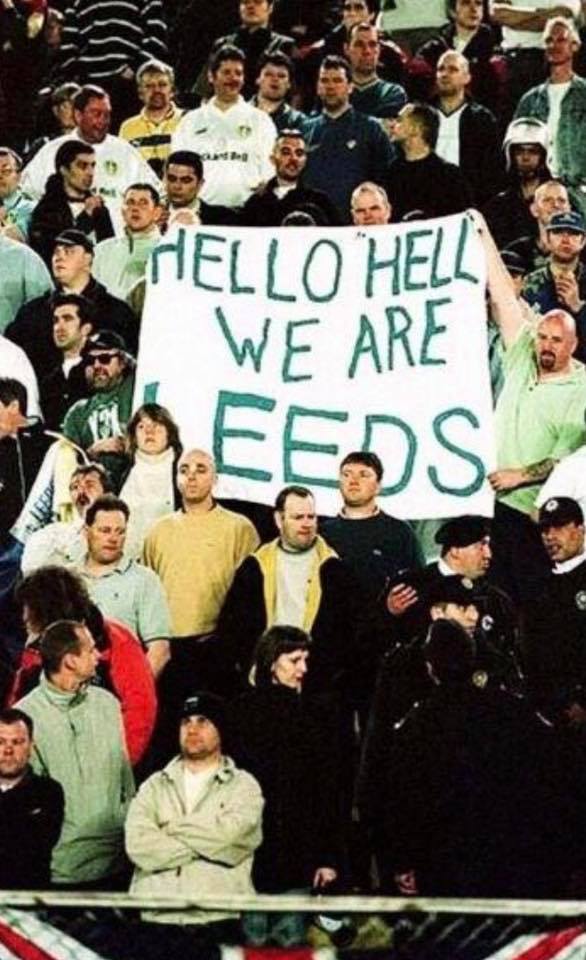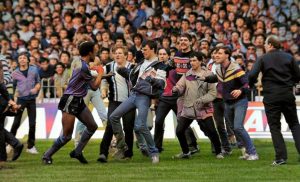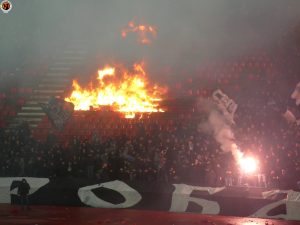
On April 5, 2000, Christopher Loftus (37) and Kevin Speight (40), two Leeds United supporters, were tragically murdered in Istanbul, just hours before the UEFA Cup semi-final second leg between Leeds United and Galatasaray. The attack, carried out by Galatasaray fans, was a result of rising tensions between the two fanbases, which had already been heightened due to provocative actions by Leeds supporters in the days leading up to the match.
The Build-Up: Tensions Between the Two Fanbases
Before the tragic events, there was little history between Leeds United and Galatasaray. However, both clubs had fanbases known for their aggressive behavior. Leeds fans, especially the Leeds Service Crew, were infamous for causing trouble at away matches, while Galatasaray’s UltrAslan ultras were equally notorious for their passionate and sometimes violent support of their team.
Leeds fans arrived in Istanbul with an already tense atmosphere surrounding the match. Although not all Leeds supporters behaved inappropriately, many were involved in acts of provocation, including taunting locals, causing disturbances in the streets, and harassing Turkish citizens. This aggressive behavior, especially around the Taksim Square area, created an air of hostility that made the situation far more volatile.
The Attack: A Brutal Response to Escalating Tensions
On April 5, 2000, the day before the match, Christopher Loftus and Kevin Speight were walking through the streets of Istanbul when they were attacked by a group of Galatasaray fans. The attackers, part of the UltrAslan group, saw the two Leeds supporters as representatives of a fanbase that had been disrespectful to their culture and people.
In a swift and brutal attack, Loftus and Speight were surrounded by a group of men, who proceeded to stab them. The assault was quick, and despite immediate medical attention, both men died from their injuries. The attack was not random—it was an act of retaliation, driven by the escalating tension and animosity between the fanbases.
Tensions That Led to Violence
The violent attack that led to the deaths of Christopher Loftus and Kevin Speight was the tragic result of escalating hostility between the Leeds United and Galatasaray fanbases. While no action can justify the senseless loss of life, the growing tension in Istanbul before the match played a role in the tragic events.
The provocative actions of some Leeds supporters, such as harassing locals, taunting Turkish people, and engaging in disruptive behavior, contributed to the hostile atmosphere. The aggressive behavior seen in public spaces, particularly around areas like Taksim Square, stoked anger among some Galatasaray fans, who were already wary of rival fans causing trouble. The attack on Loftus and Speight became an extreme and tragic response to this heightened animosity.
The Match Overshadowed by Tragedy
Despite the murders of Christopher Loftus and Kevin Speight, the match took place the following day, April 6, 2000. Galatasaray won the match 2-0, a 4-2 aggregate score in favor of Galatasaray. While the result was important to the teams, the match was overshadowed by the deaths of the two Leeds fans, and the sense of tragedy and loss dominated the evening.
The Aftermath: Football’s Darkest Moment
The deaths of Christopher Loftus and Kevin Speight sent shockwaves through the football world. Fans from all over Europe, particularly in England, reacted with disbelief and anger. The violence that had led to their deaths raised serious questions about football hooliganism and its dangerous consequences. Both Leeds United and Galatasaray condemned the attacks, and calls for stronger measures to combat fan violence were heard worldwide.
UEFA, the governing body of European football, was pressured to ensure greater safety for fans traveling to away matches. The incident also sparked a broader discussion about how to tackle hooliganism in football, particularly regarding clashes between rival ultras.
The Legacy: A Cautionary Tale
The tragedy of April 5, 2000, serves as a stark reminder of how quickly football rivalries can spiral into violence. While the passion of the game is one of its defining qualities, this event underscored how unchecked aggression can turn into something far more dangerous.
The deaths of Loftus and Speight left an indelible mark on both Leeds United and Galatasaray. In the years following the attack, both clubs took steps to ensure fan safety, and efforts to address violence in football became more pronounced. While there were attempts to prevent future tragedies, the legacy of that night remains a cautionary tale about the destructive power of fan aggression.






